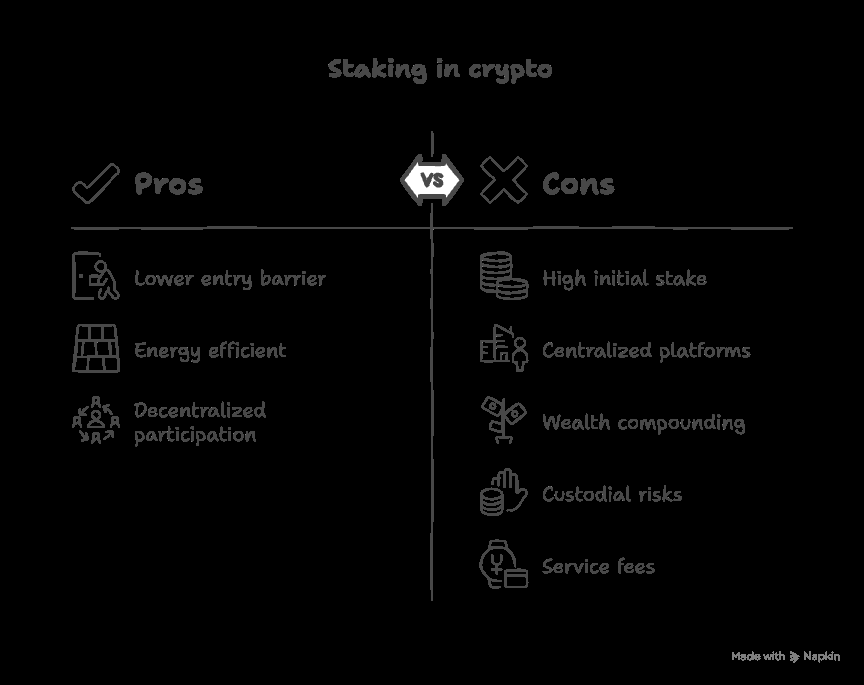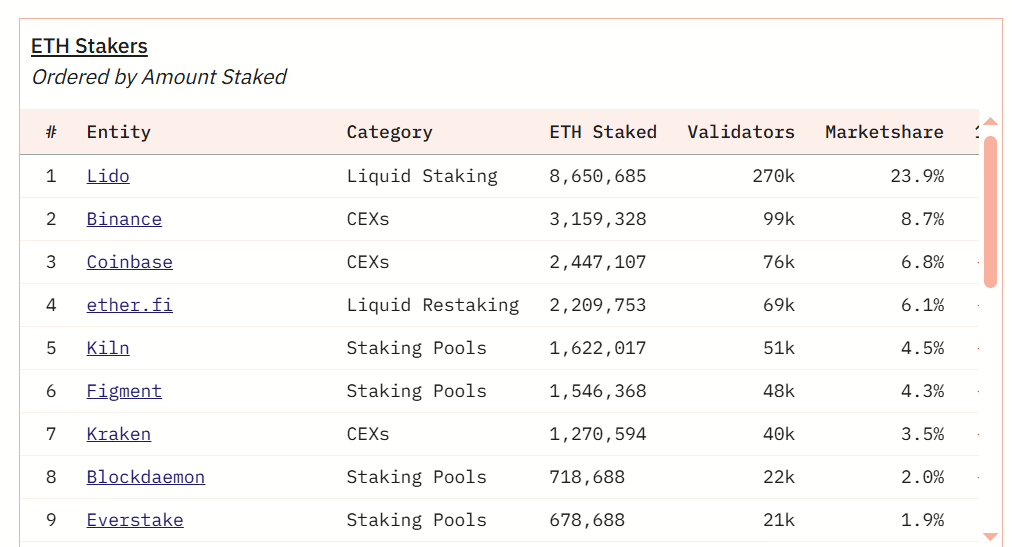As proof-of-stake (PoS) turns into the dominant consensus mechanism in blockchain, its technical and environmental benefits are sometimes praised—decrease power consumption, improved scalability, and quicker transaction speeds. Ethereum’s landmark transition from proof-of-work (PoW) to PoS throughout “The Merge” in 2022 marked a turning level, signalling that staking wasn’t simply another—it was the longer term.
On the floor, staking seems to supply a sustainable, mutually useful system: customers lock up their tokens, assist safe the community, and earn passive rewards in return. However is crypto staking a good suggestion in the long term, particularly if it subtly reinforces the identical inequities blockchain promised to repair?
Behind this interesting mannequin lies a set of uncomfortable moral questions that the crypto neighborhood is commonly too desirous to overlook.
Who actually will get to take part in staking—and who will get disregarded? Is staking reinforcing monetary inequality by favouring those that already maintain substantial wealth? And as validator energy turns into more and more concentrated, are we merely swapping one type of centralization for one more?
These questions strike on the coronary heart of what blockchain was purported to disrupt: exclusion, inequality, and centralized management. If we fail to confront the moral implications of staking, we danger undermining the very rules that crypto was constructed upon.
What Is Staking and How Does It Work?
Staking is the method via which sure blockchain networks, these utilizing Proof of Stake (PoS) or comparable consensus mechanisms, keep safety and validate transactions with out the excessive power prices related to mining. In PoS-based methods like Ethereum (after the Merge), Cardano, Solana, and others, staking replaces the necessity for energy-intensive computation with a extra environment friendly mechanism: Individuals “lock up” their cryptocurrency to assist the community.
To know how this works, contemplate Ethereum for instance. To grow to be a validator on Ethereum, a person should stake 32 ETH (price over $110,000 as of mid-2025). These staked funds act as a type of collateral, signalling dedication to the community’s integrity. As soon as staked, the participant’s cash are locked, and the validator is randomly chosen to verify transactions and create new blocks. In return for this service, they earn staking rewards, comprising newly issued ETH and a portion of transaction charges.
This mannequin has led many individuals to marvel: Are you able to earn a living staking crypto persistently? Sure—however the full image is extra advanced. Rewards range primarily based on community exercise, validator efficiency, and staking methodology (solo vs pooled).
It’s essential to notice that not all cryptocurrencies assist staking. Bitcoin, as an example, makes use of Proof of Work (PoW) and subsequently can’t be staked. Nonetheless, many different main cryptocurrencies, similar to Tezos, Polkadot, and Algorand, do provide staking alternatives, every with distinctive guidelines, minimal necessities, and reward constructions.
READ ALSO: Proof of Work (PoW) Vs Proof of Stake (PoS): How Are They Totally different?
Whereas staking affords a extra environmentally pleasant various to mining, it comes with its personal set of concerns. These are sometimes moral or financial, similar to centralization dangers, wealth-based validator choice, and the necessity for belief in staking suppliers, relatively than purely technical challenges.
Limitations to Entry for On a regular basis Customers
At first look, staking seems extra democratic than mining—there’s no want for costly {hardware} or energy-guzzling setups. However beneath this seemingly inclusive mannequin lies one of the vital missed moral challenges in crypto: accessibility. Who really will get to take part in staking, and who’s systematically excluded?
Staking is commonly hailed as a extra equitable various to proof-of-work mining; nonetheless, the fact is extra advanced. To grow to be a validator on Ethereum, for instance, customers should stake 32 ETH. That requirement alone locations impartial staking far past the attain of most international members.
For Muslims and others with faith-based monetary considerations, this additionally raises the query: Is crypto staking haram? The reply isn’t easy. Whereas staking rewards resemble curiosity or profit-sharing, interpretations range. Some students argue that PoS methods align extra with moral investing than usury, whereas others name for warning attributable to speculative parts. As with different monetary merchandise, particular person intent and implementation matter.
READ ALSO: Islamic Finance and the Blockchain Period: A Seek for Moral Compatibility
To decrease the barrier, many flip to staking swimming pools or third-party staking providers, which permit customers to take part with smaller quantities. Nonetheless, these alternate options typically include trade-offs: customers could face service charges, custodial dangers, or a lack of management over their funds. In response to a survey by Blockworks, about 60.6% of members use third-party staking platforms, gravitating towards giant, built-in providers that simplify the method and cut back the technical burden. But this reliance on intermediaries reveals a deeper challenge.
These with restricted capital typically should rely upon centralized platforms, whereas wealthier members can afford to stake independently, keep full autonomy, and acquire increased returns. This creates a two-tiered system inside networks that had been designed to be decentralized and equitable. The extra crypto you possibly can afford to stake, the extra rewards you earn—and over time, this compounds wealth for the already rich.
It raises a important moral query: Is crypto staking a good suggestion if it in the end rewards the wealthy for being wealthy? If the system is structured in order that entry and revenue are decided primarily by present wealth, then we’re not simply decentralizing finance; we’re probably reinforcing monetary inequality underneath a brand new banner.
RELATED: Will Crypto’s Wealth Distribution Ever Be Truthful?

The Phantasm of Decentralization: How Staking Swimming pools and Monetary Elitism Threaten Blockchain Beliefs
Staking was as soon as championed as a fairer, greener various to Proof of Work—one that might open up crypto participation to extra folks whereas reinforcing decentralization. However in apply, it’s slowly morphing right into a system that mirrors conventional monetary elitism, with energy consolidating not via banks or mining farms, however via staking swimming pools and institutional dominance.
To bypass the excessive capital necessities of solo staking—like Ethereum’s 32 ETH minimal—many customers flip to staking swimming pools. These platforms mixture person funds to fulfill the brink and distribute rewards proportionally. Whereas this mannequin lowers the barrier to entry, it comes at a steep moral price: centralization.
Knowledge from Dune Analytics reveals that over 40% of all staked ETH is managed by simply three entities: Lido Finance, Coinbase, and Binance—with Lido alone holding almost 26%.

This type of focus undermines the core precept of decentralization and raises a number of dangers. Centralized staking suppliers may be pressured by governments to censor transactions or implement surveillance-driven compliance. In addition they symbolize single factors of failure—if one supplier is hacked or taken offline, the safety and performance of all the community could possibly be compromised. Extra regarding nonetheless, these entities acquire outsized affect in protocol governance, enabling them to steer community choices of their favour and dilute the democratic nature of blockchain ecosystems.
On the identical time, staking is evolving right into a two-tier system. On the high are whales and institutional gamers who can stake independently, keep full management, and maximize rewards. On the backside are on a regular basis customers—particularly these in creating areas—who should depend on third-party platforms that take a minimize of their earnings and restrict their autonomy.
Reasonably than empowering the typical particular person, staking more and more rewards those that have already got probably the most, reinforcing wealth inequality inside a supposedly decentralized framework. And with rising technical complexity, questions like, Can I lose my crypto by staking grow to be a sound concern. Sure—particularly in pooled or custodial setups, the place dangers like slashing, platform failure, or custodial mismanagement are actual. Whereas uncommon, these occasions may end up in everlasting lack of belongings.
In making an attempt to unravel the technical and environmental issues of crypto, we danger recreating the very monetary hierarchies it was meant to dismantle. If decentralization turns into merely symbolic, dominated by staking cartels and monetary elites, then blockchain received’t be a revolution. It can simply be the identical outdated system, sporting a distinct masks.
Conclusion: We Want an Moral Framework for Staking
Proof of Stake has introduced simple advantages to the crypto ecosystem, dramatically lowering power consumption and enhancing scalability. But, beneath these technical positive aspects lie moral considerations that may’t be brushed apart: the focus of wealth and energy amongst just a few, the creeping centralization of validators, and the rising inaccessibility of participation for on a regular basis customers.
To maneuver ahead responsibly, the business should rethink how staking is designed and ruled. Protocols ought to be constructed to encourage decentralization, not simply effectivity. Mechanisms like weighted randomness or caps on validator affect may assist stop the dominance of huge gamers and guarantee fairer participation.
On the identical time, person training have to be prioritized. Folks deserve to grasp the true trade-offs between staking solo, utilizing a pool, or turning to custodial platforms, to allow them to make knowledgeable selections with out sacrificing management or equity.
Regulators even have a job to play, however their strategy have to be balanced. Cracking down on smaller gamers whereas permitting giant centralized platforms to increase unchecked would solely speed up the very centralization we hope to keep away from.
Staking has the potential to be a extra moral, sustainable various to Proof of Work—however provided that we design it with intention. With out cautious scrutiny and reform, we danger replicating the identical methods of inequality and centralized management that blockchain was meant to disrupt. Now’s the time to construct a framework that aligns not simply with technological innovation, however with the values of equity, transparency, and true decentralization.
Disclaimer: This piece is meant solely for informational functions and shouldn’t be thought-about buying and selling or funding recommendation. Nothing herein ought to be construed as monetary, authorized, or tax recommendation. Buying and selling or investing in cryptocurrencies carries a substantial danger of monetary loss. All the time conduct due diligence.
If you wish to learn extra market analyses like this, go to DeFi Planet and observe us on Twitter, LinkedIn, Fb, Instagram, and CoinMarketCap Neighborhood.
The put up Are We Ignoring the Ethics of Crypto Staking? appeared first on DeFi Planet.


